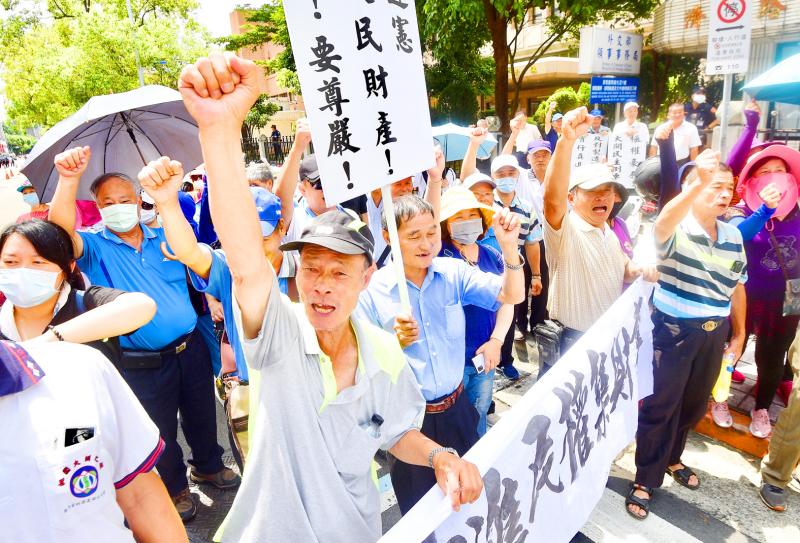The Legislative Yuan yesterday passed the third reading of a bill to convert Taiwan’s 17 irrigation associations into a government body, despite strong opposition from the Chinese Nationalist Party (KMT) and some farmers.
There are 17 irrigation associations nationwide and one joint association in Taichung, a Council of Agriculture Web site showed.
When the legislature passed amendments to the Act of Irrigation Association Organization (農田水利會組織通則) in 2018 requiring the entities to be legally defined as public juridical persons, the government was already seeking “illegitimate ways” to “infringe upon assets belonging to irrigation associations,” KMT Legislator Kung Wen-chi (孔文吉) said.

Photo: Peter Lo, Taipei Times
The amendments also stated that the head of each association should be appointed by the government, starting in October.
The government has passed the draft in a bid to nationalize the associations’ assets, which are valued at about NT$75.6 billion (US$2.56 billion), Kung said, adding that the assets belong to the associations’ members and should not be taken by the nation.
KMT Legislator Lin Yi-hua (林奕華) said that during Japanese colonial rule, Taiwanese began to think of agricultural irrigation infrastructure as public constructions, giving rise to the irrigation associations, which have been operating on their own terms for more than 100 years.
However, the Democratic Progressive Party (DDP) has resorted to a “tyranny of the majority” to forcibly pass the bill so that it can “seize associations’ assets under the guise of upgrading them to government bodies,” Lin said.
The KMT would not allow the DPP to take advantage of its parliamentary majority and act in such a wanton way, Lin said, adding that the KMT vows to demand a constitutional interpretation on the issue.
DPP caucus secretary-general Chung Chia-pin (鍾佳濱) said that if irrigation associations are non-governmental entities, they cannot enforce the law or crack down on people involved in illegal activity related to agricultural irrigation and drainage and their funds for irrigation and drainage come from the council.
Council of Agriculture Minister Chen Chi-chung (陳吉仲) said that the council would establish a new irrigation and water conservancy department, with 17 divisions, that would replace the 17 associations.
Additional reporting by Chien Hui-ju

CHAOS: Iranians took to the streets playing celebratory music after reports of Khamenei’s death on Saturday, while mourners also gathered in Tehran yesterday Iranian Supreme Leader Ayatollah Ali Khamenei was killed in a major attack on Iran launched by Israel and the US, throwing the future of the Islamic republic into doubt and raising the risk of regional instability. Iranian state television and the state-run IRNA news agency announced the 86-year-old’s death early yesterday. US President Donald Trump said it gave Iranians their “greatest chance” to “take back” their country. The announcements came after a joint US and Israeli aerial bombardment that targeted Iranian military and governmental sites. Trump said the “heavy and pinpoint bombing” would continue through the week or as long

TRUST: The KMT said it respected the US’ timing and considerations, and hoped it would continue to honor its commitments to helping Taiwan bolster its defenses and deterrence US President Donald Trump is delaying a multibillion-dollar arms sale to Taiwan to ensure his visit to Beijing is successful, a New York Times report said. The weapons sales package has stalled in the US Department of State, the report said, citing US officials it did not identify. The White House has told agencies not to push forward ahead of Trump’s meeting with Chinese President Xi Jinping (習近平), it said. The two last month held a phone call to discuss trade and geopolitical flashpoints ahead of the summit. Xi raised the Taiwan issue and urged the US to handle arms sales to

BIG SPENDERS: Foreign investors bought the most Taiwan equities since 2005, signaling confidence that an AI boom would continue to benefit chipmakers Taiwan Semiconductor Manufacturing Co’s (TSMC, 台積電) market capitalization swelled to US$2 trillion for the first time following a 4.25 percent rally in its American depositary receipts (ADR) overnight, putting the world’s biggest contract chipmaker sixth on the list of the world’s biggest companies by market capitalization, just behind Amazon.com Inc. The site CompaniesMarketcap.com ranked TSMC ahead of Saudi Aramco and Meta Platforms Inc. The Taiwanese company’s ADRs on Tuesday surged to US$385.75 on the New York Stock Exchange, as strong demand for artificial intelligence (AI) applications led to chip supply constraints and boost revenue growth to record-breaking levels. Each TSMC ADR represents

Pro-democracy media tycoon Jimmy Lai’s (黎智英) fraud conviction and prison sentence were yesterday overturned by a Hong Kong court, in a surprise legal decision that comes soon after Lai was jailed for 20 years on a separate national security charge. Judges Jeremy Poon (潘兆初), Anthea Pang (彭寶琴) and Derek Pang (彭偉昌) said in the judgement that they allowed the appeal from Lai, and another defendant in the case, to proceed, as a lower court judge had “erred.” “The Court of Appeal gave them leave to appeal against their conviction, allowed their appeals, quashed the convictions and set aside the sentences,” the judges